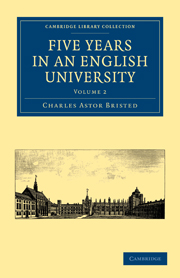Book contents
- Frontmatter
- Contents
- The Cambridge System of Education in its Intellectual Results
- Physical and Social Habits of Cambridge Men.—Their Amusements, &c
- On the State of Morals and Religion in Cambridge
- The Puseyite Disputes in Cambridge, and the Cambridge Camden Society
- Inferiority of our Colleges and Universities in Scholarships
- Supposed counterbalancing Advantages of American Colleges
- The Advantages of Classical Studies, particularly in reference to the Youth of our Country
- What can we, and what ought we, to do for our Colleges
- APPENDIX: Containing Six Exercises for Trinity Declamations, and Three for the Members' Prize
- ERRATA
Supposed counterbalancing Advantages of American Colleges
Published online by Cambridge University Press: 28 April 2011
- Frontmatter
- Contents
- The Cambridge System of Education in its Intellectual Results
- Physical and Social Habits of Cambridge Men.—Their Amusements, &c
- On the State of Morals and Religion in Cambridge
- The Puseyite Disputes in Cambridge, and the Cambridge Camden Society
- Inferiority of our Colleges and Universities in Scholarships
- Supposed counterbalancing Advantages of American Colleges
- The Advantages of Classical Studies, particularly in reference to the Youth of our Country
- What can we, and what ought we, to do for our Colleges
- APPENDIX: Containing Six Exercises for Trinity Declamations, and Three for the Members' Prize
- ERRATA
Summary
—ὄνδ ἴσατιν ὅσῳ πλέον ἥμισυ παντός
—Hesiod.“The great comedian of Athens saw that the feeling of their own insight and profundity rendered his countrymen a prey to the vulgarest delusions. The great philosopher of Athens whom that comedian ridiculed, saw still deeper into the meaning of the same fact—saw that the most clever and enlightened of the youth of Athens could talk about all manner of things, but knew nothing whatever of themselves.”
Maurice's Lectures on Education.Admitting that our colleges do not teach Latin and Greek so well as the European ones, the natural and ordinary defence is, that they teach other things, and those on the whole of more value, better. Let us examine the particulars of this defence. What are the other things taught?—are they better taught?—and are they more beneficial as means of liberal education?
And first, in relation to Mathematics. There used to be, and probably is still, a vague general impression at Yale, to the effect that the Mathematical course there is a very difficult and thorough one—that, in fact, Mathematics constitute one of the crack points of the institution.
- Type
- Chapter
- Information
- Five Years in an English University , pp. 93 - 116Publisher: Cambridge University PressPrint publication year: 2010First published in: 1852



